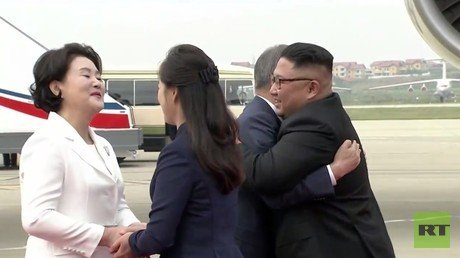Korean defense chiefs sign ‘military pact’ after Kim & Moon adopt denuclearization roadmap
South Korean President Moon Jae-in and the North Korean leader Kim Jong-un have signed a joint statement following their bilateral talks in Pyongyang. The countries’ defense chiefs have meanwhile signed a separate military pact.
As part of the military agreement, the neighbors will halt border drills from November 1, Yonhap reports. South Korean Defense Minister Song Young-moo and North Korea’s No Kwang-chol also agreed to stop military flights in the vicinity of the demarcation line. In addition, the agreement envisions setting up a buffer zone in the Yellow Sea and suspending maritime drills.
As a clear sign of mutual trust, the Pyongyang military agreement also calls for the withdrawal of soldiers from the demilitarized zone and disarming the servicemen keeping watch at Panmunjom border village. The nations also agreed that each would close eleven border guard posts by the end of 2018.
The Koreas’ armed forces will establish and operate a “joint military committee” to discuss the implementation of the military agreement on a “permanent basis,” Moon Jae-in noted.
Speaking to the press on the outcome of Moon's visit to North Korea, Kim noted that the “agreement at Pyongyang summit will advance an era of peace, prosperity.” Kim especially noted that the military agreement will help to denuclearize the peninsula and reach a lasting peace. He also agreed to travel soon to South Korea to meet Moon for the fourth time since the reconciliation effort between the neighbors began with the Olympic Peace diplomacy earlier this year. To emphasize their commitment to peace, the nations have decided to send a united team to the 2020 Olympic Games in Tokyo, and will submit a joint bid for the 2032 Summer Olympics.
Moon meanwhile told reporters that the neighbors finally managed to agree to “specific denuclearization steps.” The South Korean president also noted that the leaders are striving to turn the demilitarized zone into a zone of peace, and that work will soon begin to reconnect cross-border rails and roads before the end of the year.
Moon arrived in North Korea on Tuesday morning for the third face-to-face meeting with his counterpart. Previously, the leaders held talks on April 27 and May 26 in the border village of Panmunjom, in an unprecedented effort to reconcile the two nations following the Korean War (1950-53). Part of Moon's agenda for the trip was restarting the US-Korean dialogue that hit a brick wall last month, after Secretary of State Mike Pompeo canceled his visit to Pyongyang.
READ MORE: ‘Very exciting!’ Trump praises Pyongyang summit results & declarations
One of the major breakthroughs of the Pyongyang summit was the consent given by the North to allow international inspectors to document a “permanent dismantlement” of its key missile facilities. North Korea also agreed to closing its main nuclear complex in Yongbyon – although only if the United States takes reciprocal conciliatory steps, Moon told reporters. The Korean Peninsula should turn into a “land of peace without nuclear weapons and nuclear threats,” he noted.
"The North expressed its willingness to continue taking additional steps, such as permanent shutdown of the Yongbyon nuclear facility, should the United States take corresponding measures under the spirit of the June 12 North Korea-US joint statement," the joint statement said.
Like this story? Share it with a friend!














